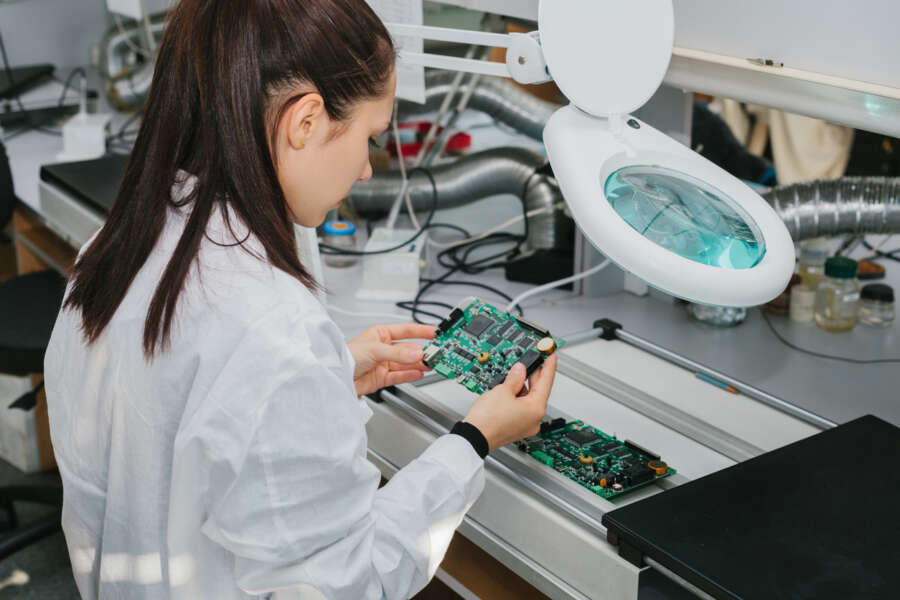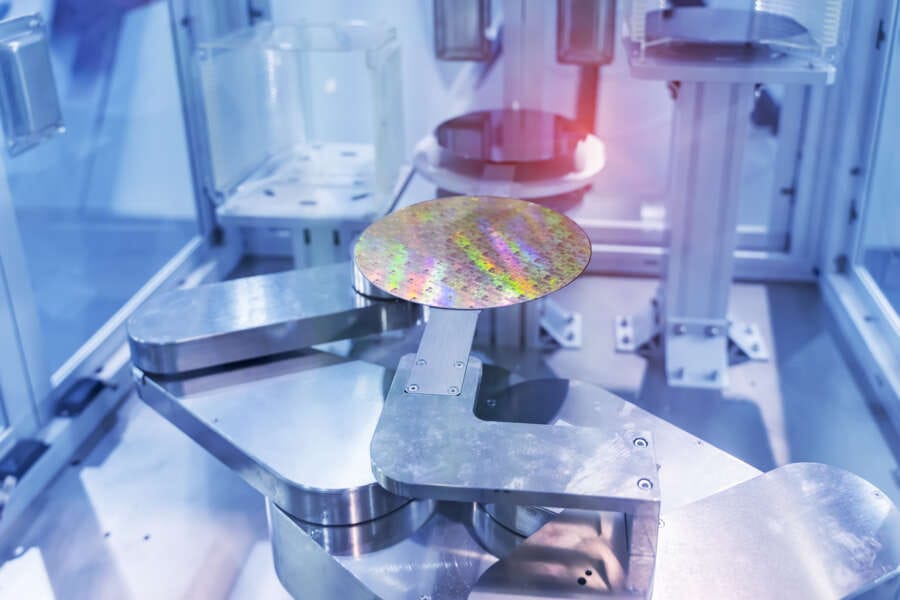
Semiconductor jobs are some of the most rewarding and lucrative in the tech industry. From engineers to scientists, these specialized professionals help create cutting-edge technology that is used in countless products and applications around the world. With salaries often reaching six figures or more, semiconductor jobs can offer a great career path for those with expertise in this field. This article will look at some of the best paying jobs in semiconductors, as well as what skills and experience you need to land them.

Semiconductor Design Engineer
Semiconductor Design Engineers are some of the most sought-after professionals in the semiconductor industry. As experts in designing and creating new chips, these engineers can play a key role in helping to develop cutting-edge technology that is used in a wide variety of products and applications. With salaries often reaching six figures or higher, this can be a great career path for those with expertise in this field.
A Semiconductor Design Engineer typically has at least a Bachelor’s degree in electronic engineering or computer science, as well as extensive experience working on digital design projects. They must have extensive knowledge of microprocessor architecture and design, along with familiarity with programming languages such as C/C++, Java, and others. They should also have strong problem-solving skills and excellent communication abilities.
Experience working with integrated circuit fabrication processes is also essential for a Semiconductor Design Engineer to succeed in their job. This includes knowledge of process control systems, yield management techniques, failure analysis methods, test strategies, packaging technologies, and more. Additionally, they should have experience setting up test plans and managing the overall project schedule from start to finish.
In addition to their technical skillset, successful Semiconductor Design Engineers must also be able to work collaboratively with other teams such as software developers and hardware engineers to ensure that the final product meets all specifications required by the customer or company. This can require negotiating deadlines and addressing issues that arise throughout the development process. Communication with both external clients and internal team members is essential for ensuring the successful completion of projects in this highly competitive field.

Process Integration Engineer
Process Integration Engineers are responsible for the development and integration of new semiconductor fabrication processes. They must have an in-depth knowledge of microelectronics, integrated circuit fabrication, and process control systems. Additionally, these engineers must be able to develop test plans and maintain close communication with both internal teams and external clients.
The average salary for a Process Integration Engineer is typically around $90,000 to $120,000 per annum. However, those with advanced technical skills or extensive experience working on complex semiconductor projects can often earn significantly higher salaries. To succeed in this field, engineers must have a thorough understanding of microelectronic design principles such as oxidation/diffusion processes, lithography techniques, and etching approaches.
In addition to their technical abilities, Process Integration Engineers must also possess strong problem-solving skills and the ability to collaborate effectively with other teams. They should also be familiar with a variety of programming languages such as C/C++ and Java to develop software used in designing new fabrication processes. To ensure the successful completion of projects, Process Integration Engineers should also be able to set up comprehensive test plans that meet customer specifications while also identifying potential issues before they arise.
This includes monitoring market trends related to technologies such as nanotechnology and high-quality imaging techniques so that they can take advantage of new advancements whenever possible. As experts in their field, Process Integration Engineers play an essential role in helping create cutting-edge technology used in countless products around the world.

Product Development Manager
Semiconductor jobs are some of the most rewarding and lucrative opportunities in tech, with salaries reaching six figures or more. Product Development Managers oversee a variety of tasks related to semiconductors from design engineers creating new chips to process integration engineers developing fabrication processes. Experience working on digital design projects and knowledge of programming languages like C/C++ is essential for success, as well as strong problem-solving abilities and communication skills. With advanced technical expertise or extensive experience in complex semiconductor projects, these positions offer great career paths that can lead to significant earnings potential!
Product Development Managers must have a thorough understanding of microelectronics and integrated circuit fabrication. This includes knowledge of oxidation/diffusion processes, lithography techniques, etching approaches, process control systems, yield management techniques, failure analysis methods, test strategies, and more. They should also possess excellent communication skills along with the ability to work collaboratively with software developers and hardware engineers. Additionally, they must be able to develop comprehensive test plans while continually monitoring market trends related to new technologies so that they can take advantage of any advancements whenever possible.
Successful Product Development Managers will have at least a Bachelor’s degree in electronic engineering or computer science and extensive experience working on digital design projects. Those with advanced technical expertise or extensive experience in complex semiconductor projects can often earn salaries reaching six figures or more. In addition to their technical abilities, Product Development Managers should also possess strong problem-solving skills and the ability to collaborate effectively with other teams to ensure the successful completion of projects.

Test and Validation Scientist
Test and Validation Scientists are key players in the semiconductor industry, playing a crucial role in the development of new technologies. Test and Validation Scientists are responsible for verifying the performance of new chips by testing them through a variety of methods to ensure that they meet all specifications. This process requires an extensive understanding of microelectronic design principles as well as familiarity with programming languages such as C/C++, Java, and others. They must also have strong problem-solving skills and excellent communication abilities.
The average salary for a Test and Validation Scientist is typically around $90,000 to $120,000 per annum, making this one of the best paying jobs in semiconductors. Those with advanced technical skills or extensive experience working on complex semiconductor projects can often earn significantly higher salaries. To succeed in this field, engineers must have an extensive knowledge of microprocessor architecture and design as well as experience setting up test plans and managing the overall project schedule from start to finish.
Successful Test and Validation Scientists must also be able to work collaboratively with other teams such as software developers and hardware engineers so that the final product meets all specifications set forth by customers or companies. This requires negotiating deadlines as well as addressing any issues that arise throughout the development process, which requires strong communication abilities both internally between team members and externally with clients.
In addition to their technical skillset, successful Test and Validation Scientists should also have detailed knowledge about integrated circuit fabrication processes such as process control systems, yield management techniques, failure analysis methods, test strategies, packaging technologies, and more. Additionally, they should possess an awareness of current market trends related to new advancements in technology like nanotechnology for example which could potentially open up new opportunities for them when taking advantage of these advancements whenever possible.
To sum it up, if you are looking for one of the best paying jobs in semiconductors then becoming a Test and Validation Scientist could be right up your alley! With salaries reaching six figures or more depending on your technical expertise or experience level in complex projects coupled with essential skills including microelectronics design principles, programming languages like C/C++ or Java, problem-solving capabilities along with strong communication abilities both internally between team members and externally with clients.

Chip Design Specialist
Chip Design Specialists are highly sought-after professionals in the semiconductor industry due to their expertise in chip design and development. As experts in creating circuits for a wide range of products and applications, these specialists play an essential role in helping create cutting-edge technology that helps propel the tech industry forward. With salaries often reaching six figures or higher, this can be a great career path for those with expertise in this field.
A Chip Design Specialist typically has at least a Bachelor’s degree in electronic engineering or computer science, as well as extensive experience working on digital design projects. They must have a comprehensive knowledge of microprocessor architecture and design, along with familiarity with programming languages such as C/C++, Java, and others. In addition to their technical skillset, they should also possess strong problem-solving skills as well as excellent communication abilities.
To succeed in this field, Chip Design Specialists must have an intimate understanding of integrated circuit fabrication processes such as process control systems, yield management techniques, failure analysis methods, test strategies, packaging technologies, and more. Experience in setting up test plans and managing the overall project schedule from start to finish is also essential for success in this role. Additionally, they should possess an understanding of current market trends related to advancements in nanotechnology and high-quality imaging techniques so that they can take advantage of any new opportunities whenever possible.
Aside from their technical abilities, successful Chip Design Specialists must also be able to work collaboratively with other teams such as software developers and hardware engineers to ensure that the final product meets customer specifications while also addressing any potential issues before they arise. Good communication abilities both internally between team members and externally with clients are key for ensuring the successful completion of projects which can lead to significant earnings potential!
Generally speaking, Chip Design Specialists are highly valued professionals who can bridge the gap between software development and hardware engineering by creating semiconductor chips used in countless products around the world. With advanced technical expertise or extensive experience working on complex projects combined with essential skills like microelectronics design principles, programming languages like C/C++ or Java, problem-solving capabilities along with strong communication abilities both internally between team members and externally with clients makes them one of the best paying jobs in semiconductors.

Applications Software Developer
Applications Software Developers are essential to the semiconductor industry, playing a vital role in creating and maintaining software used by engineers and technicians working on semiconductor projects. These professionals must have extensive knowledge of programming languages such as C/C++, Java, Python, and others coupled with strong problem-solving skills and excellent communication abilities. With advanced technical expertise or extensive experience working on complex projects, these positions offer great career paths that often lead to salaries reaching six figures or more.
With detailed knowledge of microelectronics design principles such as oxidation/diffusion processes, lithography techniques, etching approaches, and more in addition to their coding abilities, Applications Software Developers are responsible for developing code that helps engineers design new chips for a wide range of applications. They must also be able to identify potential issues before they arise by setting up comprehensive test plans that meet customer specifications while also monitoring market trends related to advancements in nanotechnology and high-quality imaging techniques so that they can take advantage of any new opportunities whenever possible.
Successful Applications Software Developers should also possess the ability to collaborate effectively with software developers and hardware engineers while negotiating deadlines when necessary. This requires strong communication abilities both internally between team members and externally with clients to ensure the successful completion of projects which can lead to significant earnings potential! Additionally, they should be familiar with operating systems like Windows, Mac OS X, and Linux as well as various embedded systems like microcontrollers and digital signal processors to develop specialized software tailored specifically for each project.
In conclusion, Applications Software Developers are highly valued professionals whose expertise helps create cutting-edge technology used by countless products around the world. With advanced technical knowledge or extensive experience on complex projects combined with essential skills such as programming languages like C/C++ or Java, problem

ASIC/Verification Engineers
ASIC/Verification Engineers are highly sought-after professionals in the semiconductor industry due to their expertise in designing, developing, and verifying integrated circuits. As experts in creating intricate and complex systems for a wide range of products and applications, these engineers play an essential role in helping create cutting-edge technology that helps propel the tech industry forward. With salaries often reaching six figures or more, this is one of the best paying jobs in semiconductors that offers great career paths for those with expertise in this field.
A typical ASIC/Verification Engineer typically has at least a Bachelor’s degree in electronic engineering or computer science, as well as extensive experience working on digital design projects. They must have a comprehensive knowledge of microprocessor architecture and design, along with familiarity with programming languages such as C/C++, Java, Python, and others. In addition to their technical skillset, they should also possess strong problem-solving skills as well as excellent communication abilities.
To succeed in this field, ASIC/Verification Engineers must have an intimate understanding of integrated circuit fabrication processes such as process control systems, yield management techniques, failure analysis methods, test strategies & packaging technologies. Experience in setting up test plans & managing the overall project schedule from start to finish is also essential for success in this role. Additionally, they should possess an awareness of current market trends related to new advancements in technology like nanotechnology which could potentially open up new opportunities when taking advantage of these advancements whenever possible.
Aside from their technical abilities successful ASIC/Verification Engineers must also be able to work collaboratively with other teams such as software developers & hardware engineers to ensure that the final product meets customer specifications while addressing any potential issues before they arise. Good communication abilities both internally between team members & externally with clients are key for ensuring the successful completion of projects which can lead to significant earnings potential!
Conclusion
Overall, the field of semiconductors offers a great opportunity for talented and skilled professionals to take advantage of high paying jobs. Whether it’s as a Test and Validation Scientist, Chip Design Specialist, or Applications Software Developer – these positions require a deep understanding of microelectronics design principles along with problem-solving skills, programming languages, and excellent communication abilities. With salaries reaching six figures or more depending on technical expertise or experience level in complex projects, success in this field can lead to highly rewarding careers that contribute to propelling the tech industry forward!


